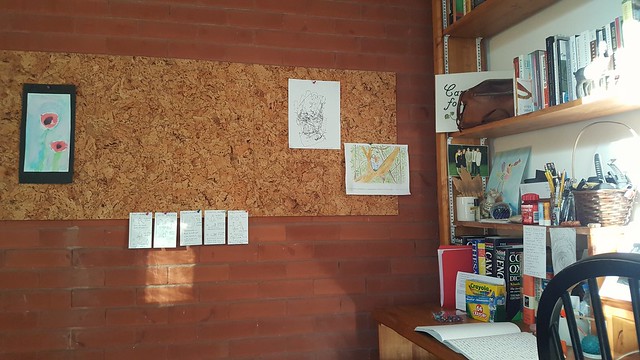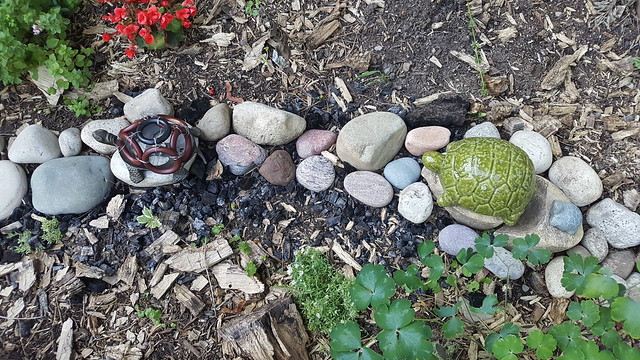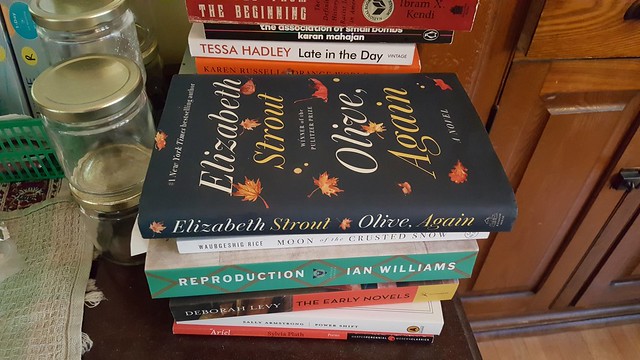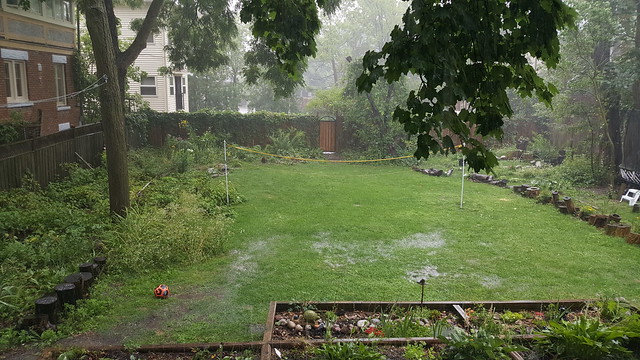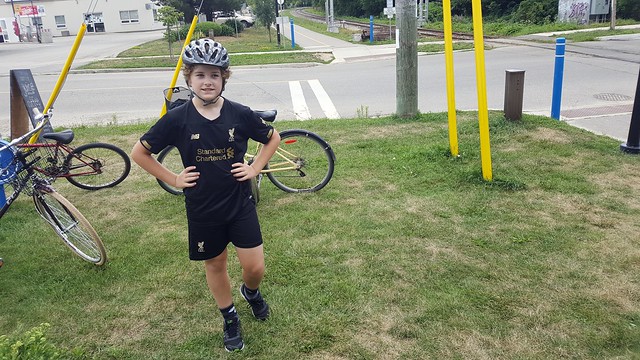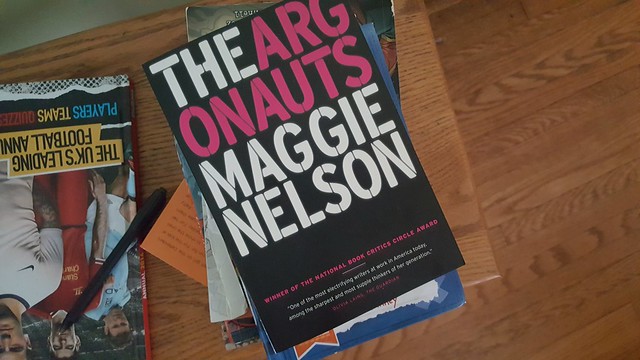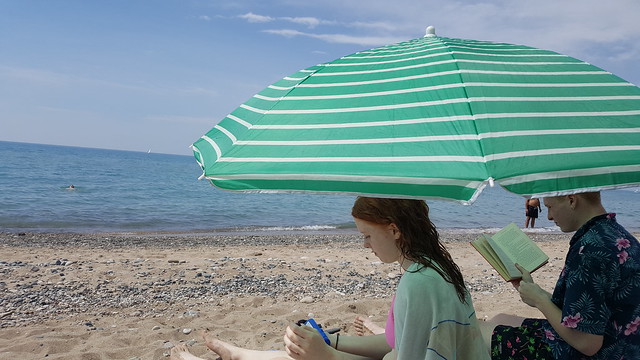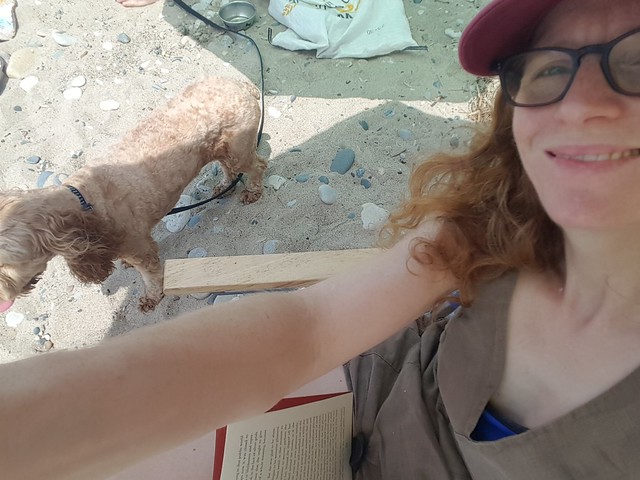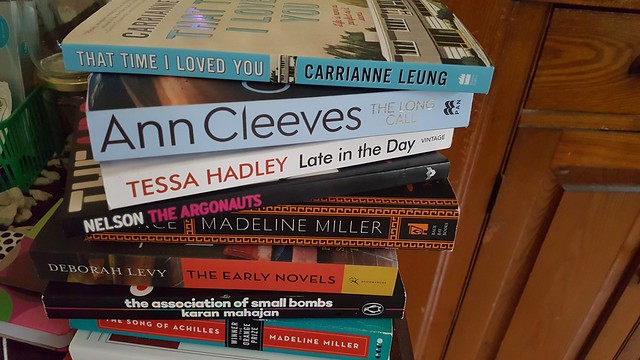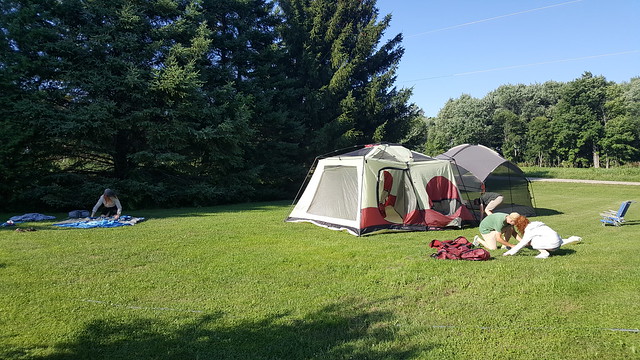Category: Reading
Friday, Sep 18, 2020 | Adventure, Art, Good News, House, Manifest, Organizing, Peace, Play, Reading, Space, Success |

I’m sitting on Great-Aunt Alice’s tiny rocking chair, wearing wool socks and a scarf, hoodie up, half-frozen; but the window is open because it’s September! Because I need fresh air. My studio is a different space than it was just a week ago, when I still called it “my office.”

Last Friday, I spent the entire day reading my friend Emily Urquhart’s new book, The Age of Creativity, which is part-memoir, part-exploration of the idea that age does not destroy or diminish creativity, even as it may alter it in significant ways. The book is about Emily’s relationship with her father, a visual artist. I was struck by the detail that, no matter where he’s lived, her dad has an ever-present corkboard on which he pins sketches and ideas for works-in-progress; I like that it is always hung on the wall beside where he eats his meals, a sign, for Emily, that he never really stops practicing his craft.

Last Saturday, I biked across town to celebrate the launch of Emily’s book, at a delightful event in her driveway. Emily shared early scenes from the book with me and Tasneem (all of us, above, at the launch), and it was wonderfully exciting to discover how Emily had structured the book in full; equally fascinating to discover — what was left out of the final version. Proof that letting go of material is as important as managing smooth transitions (note: these two elements may be the most challenging of any revision; and Emily has accomplished both brilliantly).

What’s the difference between an office and a studio?
When I decided on a whim last weekend to buy some paint and make myself a yellow door, I wanted to create a space that invited me in; the opposite of “going to work.” My studio, I hope, will be welcoming, rich with changing visual inspiration, with space to stretch and do yoga, and to spread out and draw with crayons, too; but also, organized, tidy, holding just the essentials (as defined by me!). On Saturday, I cleaned out files and drawers. I said goodbye to some projects that have aged past their time; now stored on shelves in the attic. And on Sunday, I reunited with my younger self, the self who moved often, and who always claimed her new space with a few coats of fresh paint. I painted for hours, finding the joy in the task, letting my inner-perfectionist take over; while I worked, I listened to 1619, an essential podcast from The New York Times that centres slavery at the violent heart of American history.

The new yellow door belongs to a studio.
So does the corkboard wall, the final piece to the puzzle, installed just last night by Kevin, who also researched it for me, and found a Canadian company that makes and sells all things cork. As you can see, I haven’t been brave enough to fill it with much, yet. But I hope to, and hope, too, that I will be brave enough to remove sketches and ideas when they’ve grown past their time.

Knowing what to remove, what to take down, what to edit out is as essential to completion as invention itself.
Completion is not something I’ve gotten a handle on, recently (or even in the last number of years). I’ve been making, making, making new things, raw and muddled and messy. Now to learn (re-learn) how to finish projects, too.
Welcome to my studio.
xo, Carrie
Sunday, Aug 16, 2020 | Art, Big Thoughts, Blogging, Book Review, Books, Confessions, Current events, Dream, Family, Manifest, Peace, Play, Politics, Publishing, Reading, Spirit, Stand, Work, Writing |

This blog is like a corkboard on which to post thoughts, observations, whatever is front-of-mind right now. It acts as a public journal, an I WAS HERE scrawl on the wall. Trouble is, recently, whenever I sit down to post something, it’s not clear to me what’s front-of-mind. Mind is a-jumble. Influences are disparate and scrolling, images aflame, voices shouting, protests, outrage. What calls my attention is both very personal and tiny (my morning routine, for example) and overwhelmingly political and heavy (can’t even begin to list it parenthetically).
This morning I read an article by Lori Fox in The Globe and Mail that pretty much sums up what I’ve been ranting to Kevin about for these past many months. Please read what she’s written and know that I’m nodding along. At one point in the article, she writes about her own “small, selfish” dream. It’s a lovely dream. To paraphrase: Work that is useful and that she loves doing. Enough, and the time to enjoy it. A life with dignity and love.
It’s small enough, isn’t it, that everyone should dare to dream such a dream? Everyone should have the means of achieving it? It doesn’t sound selfish to me.

Originally, when I sat down to write this post it was about my own lovely week, which I spent reading stories, editing stories, and talking about stories. But when I wrote about how lovely it was, and how purposeful and peaceful I felt doing this work (tiny, personal), I also found myself tracking into the weeds of dismay and guilt, confusion and fury (overwhelming, political) as I reflected on how it was privilege that allowed me to do this work.
Earlier in the week, I watched this interview with Kurt Anderson on PBS (my favourite American news source), and it stirred in me emotions that I’ve been unable to unstir. Essentially, he argues that 1976 was the most equitable year on record (in America), and due to a wealth-driven philosophy that focuses on profit to the exclusion of all other concerns, we now find ourselves living in an economy that offers that “small, selfish” dream to fewer and fewer people. I realize that I live in Canada, not the US, but we’re not immune to troubling inequity. When I eat a peach, I can’t help but think of the hand that picked it, and wonder where that person is from, how much they’re being paid, and where they’re sleeping. Essential work is being done by people who are treated as less-than. And the system makes us complicit, even as we’re stuck in it.
How many people do you know whose work is precarious, cobbled-together gig by gig, without benefits or retirement packages? Look around, and you’ll see that defines a lot of us, even those who seem to be doing okay. How many jobs that were once secure and well-paid are now being done by people who work on contract or freelance? Remember when earning a PhD meant tenure-track job-security? I remember when writers were paid a dollar/word for book reviews published in the newspaper. You can argue that sectors that are struggling are sectors that are becoming obsolete in today’s economy; but that’s not necessarily true. Is education obsolete? Are the arts obsolete? What about news? Long-term care? Sectors struggle for many reasons, but what I see is that a profit-only model doesn’t work for the people who actually do the labour. Because in the profit-only model, labour is a cost. You squeeze the costs down, you make more profit. Ultimately, that means you’re squeezing people — you’re paying people less and less to do more and more. And the people are us.
I can observe all of this, and be outraged, but it tends to lead me toward paralysis. What’s the fix, what’s the cure?

Yesterday, I sat outside and read Olive, Again, by Elizabeth Strout, which I noticed, upon finishing, is labelled “A Novel.” I think that’s an American thing? The book is actually a collection of linked short stories, my favourite form, although I know linked short stories don’t sell well, so maybe “A Novel” is a marketing thing. In any case, the book doesn’t need to be anything other than what it is: stories about characters (often Olive, but sometimes not) navigating their broken paths and trying to figure out how to talk to each other and protect themselves across divides of class, race, culture, age, abuse, pain, illness, secrecy, experience, self-doubt. It’s brilliant, and I wept often, throughout.
Upon finishing, I thought: I just want to sit and read stories all day long. And then I’ll take a break and write stories for others to read. And then I’ll meet with people who love reading and writing and we’ll talk about it, and I’ll edit my stories and theirs. When I do this work I’m not always right, but I know what I’m doing and why.
Is this a roadmap for a career???? God, let it be so. At the very least, it’s a roadmap for making sense of life. For helping me see and understand and know what matters. And it ain’t profit, my friends (but you already know that!). We all know it, gut-deep: profit isn’t profitable when it costs us our communities, our health, our dignity.

Here’s my own small, selfish dream: I want to read, write, edit, discuss; work that has it uses, its purpose. And I want others to be able to do this work too, as they’re called to it.
Truth: A lot of my work is done on a voluntary basis (it’s my speciality!). But here’s the thing: volunteer work is not necessarily noble. People volunteer because they can afford to. I’m worried that my willingness and ability to work for little to no recompense is part of the problem. Consider the arts sector, where many initiatives survive because of people like me: Doesn’t this very structure — reliance on voluntary labour — create barriers toward participation for everyone who can’t afford to work for free?
But what’s the alternative in a sector that’s not profit-driven and never will be, that survives on grants, fundraising … and underpaid / unpaid labour?
It’s a dilemma that’s been troubling me. A lot.
And I’ve come around to a solution, of sorts: Universal Basic Income. It’s not perfect, but it seems like the viable place to start. A baseline of security, so everyone can afford their own tiny, personal dream: Enough and time to enjoy it. Dignity and love. Work that is useful and that you love doing.
(See what I mean? This post is WAY TOO MUCH, but it’s where my head is at, right now.)
xo, Carrie
Friday, Jul 31, 2020 | Big Thoughts, Books, Coaching, Confessions, Current events, Driving, Exercise, Family, Friends, Fun, Lists, Manifest, Mothering, Peace, Reading, Space, Spirit, Summer, Yoga |

July Reflections
- What felt good this month? Being outside! The weather has been splendid (I live for the heat), and our back yard is inviting, lush, pretty, full of birds and wild critters (including skunks, but that discovery goes into a different category). I’ve been running regularly, never more than 5km, always early in the morning through the park. This past week, CJ and I have been on almost-daily bike adventures, on paths and trails and quiet streets throughout the city (and I’m so glad he’s still happy to go on adventures with me!). Annie and I do yoga outside every morning, and it’s bliss to lie back and look at the sky. Our family has been using the gazebo area to entertain friends, socially distanced, of course; meeting face-to-face is so much sweeter than Zoom, though I’ll continue to appreciate Zoom for making it possible to see each other when it isn’t otherwise feasible. We’ve been camping, we’ve lounged at the beach. Bottom line: I’m drinking up this season, positively gorging on it, while it lasts.
- What did you struggle with? Resigning from coaching soccer. It was a painful decision. But I wasn’t comfortable returning to the field this summer, and I had to make the call one way or the other. I’m a big believer in finishing what you start, and in not bailing on commitments even when it gets hard; but ultimately it didn’t feel like I was being asked to do what I’d signed up for. In truth, my decision came from deep in my guts, and when a decision rises from there, it’s important to listen. So I said goodbye to the players; with gratitude for other coaches willing to step in. For someone who has difficulty saying “No,” this has been a valuable process to work through. My mental health seems more stable this month, too, and I wonder whether the looming return-to-play was weighing more heavily on my mind than I was willing to acknowledge at the time.
- Where are you now compared to the beginning of the month? More chilled-out. I’ve been reading lots of books, and napping on the couch. Less Twitter too! Haven’t written much new material in the past two weeks … but it hasn’t felt imperative. What feels imperative is feeding my mind with new ideas, hanging out with my kids, seeing friends, sticking to an early morning exercise routine. To everything there is a season. I’m submitting to the flow.
- How did you take care of yourself? This month, I continued to tend to my physical and mental health. I’ve been countering negative thoughts with journaling. I try to notice when I’m being unkind to myself, and to assess whether it’s accurate or based on an irrational or subconscious pattern of thought. I’m doing tons of stretching and strengthening (physio homework). Texting/talking with friends is also good self-care, I realize. I’ve been telling my body how much I appreciate it. I’ve been trying to apply the idea of acceptance as a form of love to myself, as well as to my loved ones. Don’t we all just want to be loved and appreciated for who we are, flaws and all? Becoming takes a lifetime. We’re all going it at our own pace, so let’s walk there together, in kindness and generosity.
- What would you most like to remember? Standing in the driveway, listening to my mom tell stories about her past. Biking behind CJ as he learns to lead the way. Laughing around the campfire. Wind blowing through open car windows. The comet shining like a flashlight in the night sky. The sound of many many birds. Being in motion, going somewhere, even if just around the block. The sky.
- What do you need to let go of? Anxiety, especially about everything that’s out of my control. Maggie Nelson writes about “prophylactic anxiety” in her book The Argonauts (her marvellous, genre-defying, mind-stretching book). In fact, I’m noticing that it’s her own mother who cannot escape from this need to anticipate and rehearse for the very worst, at all times. Maggie Nelson quotes Freud’s definition of anxiety: “Anxiety describes a particular state of expecting the danger or preparing for it, even though it may be an unknown one.” My kids have been helping me notice the many ways in which I apply prophylactic anxiety, which I’ve preferred to call “vigilance,” to a multiplicity of situations in our shared lives. But you know—one cannot be ever-vigilant, ever-watchful. I cannot be. It’s a poor state in which to live one’s life. There’s no fun in it; dire warnings aren’t fun to broadcast or receive, and all but the most crucial are probably counter-productive. Is it the responsibility of a mother to prevent disaster? I feel quite certain that this has been the standard you-are-a-mother-and-this-is-your-job messaging. But maybe, just maybe, it’s not.
xo, Carrie
Thursday, Jul 30, 2020 | Big Thoughts, Confessions, Current events, Death, Manifest, Mothering, Parenting, Peace, Politics, Reading, Summer, Word of the Year, Work, Writing |

The bugs whirring in the trees. The sound of wind through branches. Cars and trucks grinding by on the nearby streets. I am gliding through these days. Maybe I want to keep this time, but maybe I also want to let it be. Let it roll like weather, let myself rest in the grass and look at the sky, so different every time, completely clear this morning with sunlight at the tips of the trees, the leaves lit from behind, green etched on pale blue.
I am waiting to discover something—what?—new?—about myself? about my purpose? about what I might become? I wonder why I always feel so sure that I am becoming—it seems so optimistic; because of course I am so sure that what I am becoming will be an improvement on this present iteration of self.
I’ve noticed that my flaws are magnified by this time of intense closeness with my little family unit. There are fewer of the everyday, outside, fleeting social interactions that help me to see myself differently; at home, my relationships tend to be more raw, less inhibited by boundaries and graces. In the outside world, I perform civility. Home is where I let my hair down (or wind it into a messy bun, more often!), seen only by those closest to me, who are also most bound to me and therefore most forgiving. Within these close relationships, I see reflected my limitations, my tendencies, my patterns, my behavioural tics and triggers. In truth, it is more often than not painful, humbling.
The question presents itself almost non-stop: Do I want to change? And if the answer is yes, what would I like to become, if not this?
Also, acceptance: this is what I’ve got to build upon.

This weekend, I listened to this On Being interview from 2013 with John Lewis. I’ve been thinking a lot about non-violent resistance, and what it means; and its relationship to my faith and faith tradition in the Mennonite church. I am planted in this soil. Here are my roots. How do I flower and grow and express “love in action”? The idea of resistance infers that against which you must resist—there is an implied relationship, a force that is pushing back. What John Lewis seemed to know is that in order for “good trouble” to bear fruit, you must present yourself at the edge, where you can meet resistance. You must be morally unassailable, dignified, restrained, patient, but also forgiving (of yourself and others). Non-violent resistance is hard, it requires self-discipline, rehearsal, practice (you learn to protect your head with your arms, you learn to curl into a ball on the ground, in practical terms). To win the moral battle, which may or may not move you closer toward your goal, you must be spiritually prepared to suffer. But to meet resistance effectively, you also need clarity of mission. The thing against which you are resisting must be clearly in view.

I’ve been thinking, too, that I lack clarity of mission. I don’t know my own goals. And this is why it feels like I’m waiting. (I’ve also been reading Maggie Nelson’s The Argonauts and thinking about the many ways in which human beings cause each other pain and are hurt, despite our best intentions, despite trying to protect ourselves; and how powerless that can make us feel, to act, to respond, to seek out relationship with others.)
re resistance, re mission, re goals, just found this in my notes: I still need to write that blog post about the flaws in the system. Which flaws? Which system?
Too many flaws, too many systems.
On this subject, more to come. But I shall spare you and stop here for now.
xo, Carrie
Wednesday, Jul 22, 2020 | Adventure, Art, Big Thoughts, Book Review, Books, Current events, Fun, Good News, Holidays, Politics, Publishing, Reading, Spirit, Work, Writing |

A marvellous way to escape from the stasis and repetition of the everyday is by reading books. I’ve been reading more books these days than I have for a very long time, reading not merely for professional purposes, but as a fan.
And I just want to say: Read, friends, read!
Read a book! You won’t regret it! Sink in, let your brain get accustomed to taking the long, slow, scenic route instead of scrolling yourself down an endless wall of text. This might sound like self-serving advice, but really, I feel born-again.

Read a book!
It’s an immersion in a way that other forms of “entertainment” and learning are not, because it also involves engagement, as your mind works to build worlds and make connections. There are ideas and images forming inside your brain—new to you, exciting, challenging, alarming, frustrating, fresh and unknown—as you follow the line of words across the page. These brand-new images are transferred into the landscape of experiences, memories, and images that already belong to you. Connections between these worlds pop and crackle and spark something that has the potential to feel revelatory and transformative (at best), or at least interesting, different from your usual point of view.
Inside your mind, as you read a book, you’re actively creating something that is both collaborative and personal. You’re reading something written in a different time that is speaking to where you are right now (or attempting to). I think this is why it can feel like you know an author really well—because you’ve actually made something together when you read their book, even when you’re collaborating across cultures, languages, places, and times.

This past weekend, in related news, we camped at my brother and sister-in-law’s farm, and went to the beach. And we read books. I even stayed up late one night to finish a conventional but highly entertaining murder mystery, borrowed from my brother (Ann Cleeves, The Long Call). I’d finished the book I’d brought camping (Tessa Hadley, Late in the Day), a book with which I had an ongoing argument, as it featured wealthy white British characters, several of whom were artists; at times, I strongly disliked everything about the book, but then bits seemed to capture something important about creating art, especially as a woman, and how valuable it is to have a champion, especially a patron with money and influence, but also how dangerous. In the end, it was the engagement with ideas, the argument with the book itself, that kept me transported and hooked.

Books transport me in so many different ways. Reading Carrianne Leung’s That Time I Loved You brought me into characters who broke my heart, and with whom I craved even more time, and afterward I wanted to talk about these people like they were real; reading Kiley Reid’s Such a Fun Age was both accusation and encouragement to reflect on my own transactional relationships, even while it pulled me along with a propulsive plot; reading Glennon Doyle’s Untamed stirred up a mixture of emotions, including the desire to protect this seemingly vulnerable writer from her own blind spots, and respect for occasions of raw insight.
I’ve just started Maggie Nelson’s The Argonauts, and already I feel like the top of my head has been lifted to make room for more seeing, more questions, more ways to jab at and unpeel my identity, my ways and means of performing myself.

Writing is not a glamorous job. Progress is made at a glacial pace, if what you’re doing can be even be seen as progress; it might be more rightly called meandering, looping, wondering, wandering. You can’t see what you’re making. You can’t know how it will be received, if it ever gets loose, let alone completed. You don’t know what arguments a stranger might have with what you’ve conjured on the page.
It often doesn’t feel like important or valuable work; certainly it doesn’t feel very useful a lot of the time. But when I read books, I know exactly why I write, and why I’ve chosen this wondering, wandering path. When I read, I feel belonging and expansion, both, at once. When I write, I feel like a giddy participant in a long, ongoing conversation about being alive, being a part of it all, in my own time and place and body, right now.

Right now, Canadian publishing is suffering. (Read this, if you want to know more about the nitty-gritty business of the industry.) But listen up, friends! If you’re lucky, you still have an independent bookstore operating despite the pandemic, and they’re the ones (according to the cited article) who have the potential to keep this fragile/tough cultural industry alive. All the books mentioned above (and many more!) were purchased at Words Worth Books in uptown Waterloo. Order online, pick up in the alley behind the store; or they deliver locally. Do a bit of searching. Find what’s available near you. There are many independent options other than Amazon, and these options are run by people who love books, too. They love reading. They believe in the collaboration between words on the page and individual minds. They want to challenge your horizons, send you on adventures, keep you up late at night. Amazon’s algorithm just wants to sell you more of the same.
Those are my thoughts for today. More ideas, coming soon.
xo, Carrie
Saturday, Feb 1, 2020 | Art, Big Thoughts, Book Review, Books, Confessions, Drawing, Exercise, Reading, Sleep, Spirit, Writing |

I wasn’t in a good cartooning mood yesterday. But I wanted to capture this quotation from Elizabeth Strout’s novel My Name is Lucy Barton, which I was reading. So I sat down and wrote it out, arranging the words on the page as if they were a poem. I started by writing the words in non-photo blue pencil, and inked them in afterward. I was quite sleep-deprived, and realized only later, when reading over my efforts, how many “typos” I’d made. So it wasn’t a good cartooning day. To cartoon, you need patience, focus, concentration. In keeping with my word of the year, I’m trying to pay attention to what manifests, in order to understand what’s underneath. In all honesty, I might not have noticed I was lacking those traits yesterday if I hadn’t tried to cartoon.
In conclusion, I need more sleep. I have been trying to get 7 hours of sleep each night, consistently; trying and failing, I must add. I’m addicted to early morning exercise. It’s my bliss. And that means getting to bed earlier. Which means turning off my phone earlier, and climbing into bed with a book. Like the one in which I found the words I felt compelled to record, above. But I confess it’s a hard habit to change — to read a book instead of scrolling though social media feeds. The latter offers the illusion of connection, and sometimes, in the case of Twitter, a steady stream of outrage that temporarily livens my brain; but also drains me of real purpose, or the desire to act in real, tangible ways.
When I read, especially fiction, I transcend the body I’m in and become familiar with other bodies, other realities, through immersive sensory perceptions. I see through other eyes. And in this exchange, I often feel seen, or feel able to see myself more clearly. That is how I felt reading the passage above: It says what I cannot.
Reading it, I wanted to write out the words so I could keep them in tangible form. The words called out from me a response. Which led me here. Which is, where, exactly? Sitting at my desk on a dull Saturday afternoon, the first day of February, my fingers smelling of peeled garlic, not vacuuming or cleaning the bathrooms, composing a small gathering of thoughts for release, winging out into the ether.
One final thought: I write fiction to know how others are, in large part because “I realize I don’t know how others are.” But one of the oddest things I’ve discovered while writing a collection of autobiographical stories, is that I also don’t know how I am. Fiction is a necessary construction, and sometimes it becomes a mirror. A fictional character, like Lucy Barton, can say what we cannot because as a projection of her author’s imagination she is elaborately protected from the particular dangers of human pain, and this makes her free, as a character, to reveal what our human minds protect us from most vigilantly — her ambiguities, confusion, contradictions, the places where she gets stuck, the ways in which she hurts others, her lies and her truths. We see her, and we see ourselves more clearly for a moment, too.
There are times, unexpected —
xo, Carrie
Page 4 of 17« First«...23456...10...»Last » 

